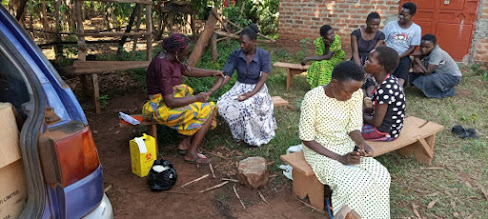by Tumusiime Loy, Program Coordinator
He remembers feeling conflicted the first time he attended a reproductive health sensitization for men; his family has always supported having many children to help earn income and build the family’s wealth, but UVP presented a different perspective, one that aligned with John’s reality – that he was struggling to support his two wives and four children.
As a boy, John had a tough childhood. John’s family struggled to support him and his five siblings, so he didn’t attend school and is unab
le to read or write much. When he became an orphan at 14, he worked anywhere he could to provide for himself, and sometimes his employers did not treat him very well. That’s why John wanted to start his own business, so he didn’t have to work for anyone else who might mistreat him. But with the responsibility of taking care of his families, he couldn’t save enough to invest in his dream of starting a business.
As he saw it, modern contraceptive options were the answer he was looking for to keep his families manageable. Since learning about the different contraceptive options, John and his wives have been enrolled in UVP’s family planning program since 2017. With the peace of mind John has knowing he would have children by choice, he began saving to start his business, and in 2019, he started his chapati business, fulfilling a long-time dream!
Like any parent, John just wants his family to be healthy and happy. “I am able to balance my families, spending more time with each child, and I recently noticed that the children have been gaining weight,” John said excitedly. “I needed experts to teach me, not ancestors or anything else. I’m so indebted to UVP for the education that has helped us improve our situation – thank you!” John continued, excitedly, becoming overwhelmed with gratitude to the point of tears.
Support John and others like him by donating to provide contraceptives in hard-to-reach places - do your part to reach 50,000 people with health education and services in 2021! #BringOn2021 #2021HereWeCome
(Don't prefer PayPal? You can also use Facebook or MightyCause!)









